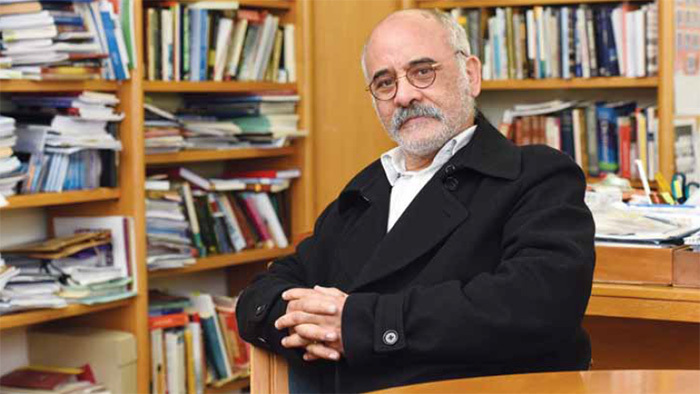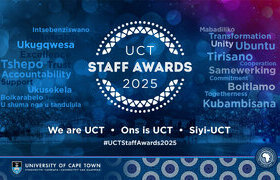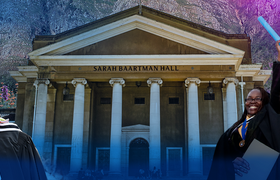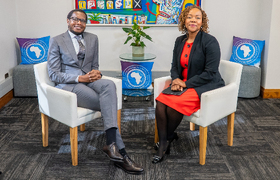Farewell to the 'everywhere man'
25 August 2015
It's been a career defined by the 'politics of belonging' for outgoing Deputy Vice-Chancellor Professor Crain Soudien. In this interview with Monday Monthly he talks about his first day at UCT 42 years ago and what it feels like to be caught in the middle of some of the hottest debates on campus.
"Yes, it has been very strange," says Soudien of leaving UCT at the end of August. In September, Soudien takes up his position as the newly appointed CEO of the Human Sciences Research Council in Pretoria, bringing to a close a significant chapter of his life at UCT that started some 42 years ago.
Soudien, a recognised authority on education and social inequality, has been Deputy Vice-Chancellor for Transformation and Student Affairs since 2009. He held joint professorships in Education and African Studies and chaired the Ministerial Review Committee into Transformation in Higher Education that produced what became known as the 'Soudien Report'.
'Everywhere is home'
But Soudien had begun grappling with issues of injustice and education long before he enrolled as an undergraduate student at UCT in 1973 or joined the Faculty of Education in 1988. At the time, just deciding where to study was a "political choice", he points out.
Raised in Johannesburg and having been schooled in the UK, he refused to attend an "apartheid institution" like the University of Durban-Westville. With the advice of his father, he chose UCT from a range of options, among them Roma in Lesotho and universities in the UK.
He cites Edward Said, the late postcolonial literary critic who wrote extensively on the politics of exile and belonging.
"For most of my life as a sociologist, I've tried to live according to the Said ideal of 'everywhere being home'... and I make the argument myself that I, as a human being, need to consciously think of everywhere as part of my commitment and responsibility, my connectedness to life."
He vividly recalls his first day at UCT, when he was introduced to what became his favourite space. "The taxi drops me at the foot of Jammie Steps [there was no plaza back then] and I get out into this mass of young people. That was a memorable moment for me arriving as a stranger to Cape Town into that environment."
University Avenue brings back "very nostalgic memories" of how he had to find his place on the campus, but he was also acutely aware that he came as a "privileged person" whose political education had begun in Johannesburg's "liberal anti-apartheid community".
It was along that avenue that people like Roy Gentle – whom he describes as having been "more politically sophisticated" than himself – formed the core of an environment that Soudien says was unconditional in its demand "for all of us to express our full dignity as human beings".
"We were living in a politically subjugated space, [but] the disenfranchisement of people such as myself didn't reproduce itself in my kind of psychologies."
Not quite a middleman
Soudien has been at the coalface of many seminal moments for education in South Africa, from the 1976 Soweto Uprising to the 'Mamdani affair' at UCT in the late 1990s which sparked a transformation debate of its own.
At the time, Professor Mahmood Mamdani held the AC Jordan chair in the Centre for African Studies. A dispute between himself and members of a curriculum planning committee about what should be taught on the course ultimately led to his very public departure from UCT.
How did something like the Mamdani affair affect what Soudien did at the university?
"It was personally complicated for me because I knew all of the people involved, and I had personal relationships with all of the people involved."
No stranger at being caught in the middle of such points of conflict and tension, Rhodes Must Fall is a more recent example of a similar scenario.
"It's about being in the middle of something which is not a cut-and-dried politics of positioning, where it's clear on (either) side," Soudien says. "And this is important stuff to talk about. Historically I land up in situations where I have both political and, if you like, organisational relationships, that in the heat of the moment would ... be understood as being in the middle."
Soudien again references Said: "I don't belong to anybody, right? I don't belong to any group; I don't feel a kind of atavistic sense in a primordial way that I owe blood loyalty to anything or to anybody."
Has UCT changed since 1973?
"We were on campus at difficult times," he says. He and his contemporaries couldn't easily join the campus clubs and societies, but the students they associated with made the point that they hadn't come to UCT to participate in the kind of extramural activities that "diminished our sense of humanity ... we boycotted them deliberately".
Of course they were interested in student politics and student life, but knew that this too involved the "politics of complicity".
One might be critical of the 1994 settlement, but it opened access to the political machinery and governance structures, Soudien says. ?Students now have an unfettered right to [these structures] in a way we didn't; we were not allowed to, and that's the major difference.? Soudien remains an Emeritus Professor so he hopes to retain regular contact with the university.
"But it will be strange not having an office here..."
Postscript from a confidante
As personal assistant, Jenny Boyes enjoyed close working relationships with deputy vice-chancellors Professor Crain Soudien, during his recent Bremner tenure, and the late Professor Martin West, with whom she worked for 17 years.
Boyes, who leaves UCT on early retirement at the end of 2015, says: "This has been a tough year, but I've been very lucky. Both (Soudien and West) have been the most wonderful people to work with."
Boyes has been at UCT since 1986 when she worked with former Vice- Chancellor Dr Stuart Saunders, and has seen her share of turmoil on campus, especially during the 1980s.
Speaking of Soudien, her most recent boss, she says: "He has taught me an awful lot about a lot of issues. Crain particularly, as far as humanity goes, and his care for – what would you say – the underdog? That's where his passion is – with education, inequality and anything to do with the protection of the human race, I've just found him amazing."
She points to his crammed desk: "As you can see, he gives his all to his job, hence the office being rather crowded with papers and books!"
Story by Yusuf Omar. Photo by Michael Hammond.
 This work is licensed under a Creative Commons Attribution-NoDerivatives 4.0 International License.
This work is licensed under a Creative Commons Attribution-NoDerivatives 4.0 International License.
Please view the republishing articles page for more information.










